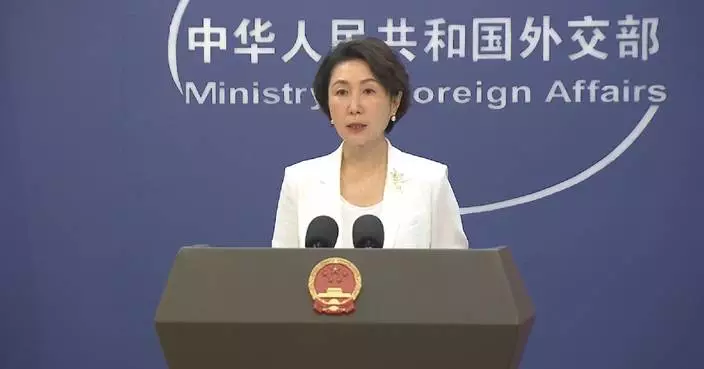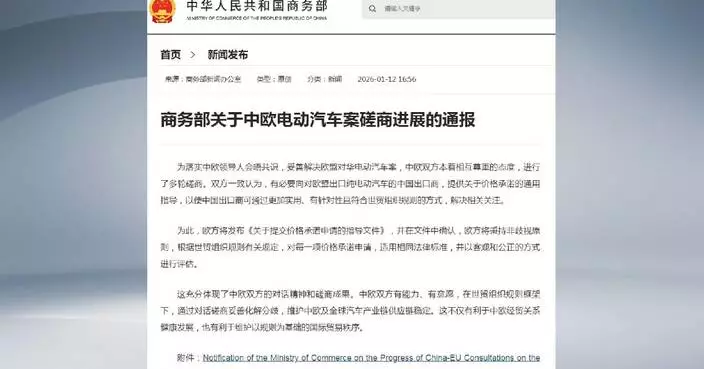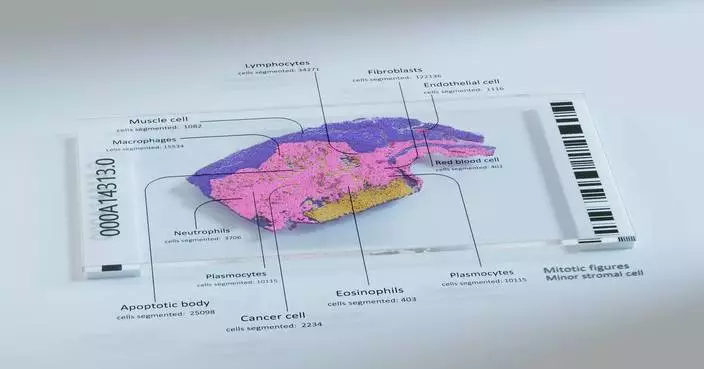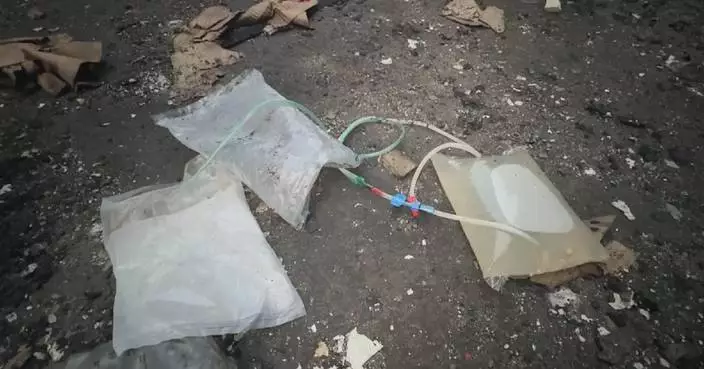Feature · News

Tech companies lead Hong Kong shares rally on Monday: analyst

People rally around the world in support of protests in Iran, in photos

Traffic operating normally, internet remains restricted in Tehran

China’s 2026 consumption season fuels holiday shopping boom nationwide

Canadian PM to visit China: spokeswoman

Photos of Syrians fleeing violence in Aleppo as shelling leaves heavy damage

BP China Insight : Former U.S. Ambassador to NATO: Trump Obsessed with Oil; China Bets on Electricity

China, EU agree on price undertaking guidance for Chinese electric vehicle exporters: commerce ministry

China issues landmark regulation on allocation of government investment funds

China's winter tourism surges with boosted inbound visitors, facilitated travel services

Pope Leo XIV meets with Venezuelan opposition leader María Corina Machado in a surprise audience

Malaysia and Indonesia become the first countries to block Musk’s Grok over sexualized AI images

Former Polish justice minister who faces prosecution at home says he's received asylum in Hungary

BioMed Realty and TransMedics Announce 498,000-Square-Foot Lease at Assembly Innovation Park

What to know about the Uvalde school shooting trial as it heads into its second week

Muhammad Ali will be honored with a commemorative US postage stamp

BP China Insight : Former U.S. Ambassador to NATO: Trump Obsessed with Oil; China Bets on Electricity
China, EU agree on price undertaking guidance for Chinese electric vehicle exporters: commerce ministry
China issues landmark regulation on allocation of government investment funds
China's winter tourism surges with boosted inbound visitors, facilitated travel services
Tech companies lead Hong Kong shares rally on Monday: analyst

People rally around the world in support of protests in Iran, in photos
Traffic operating normally, internet remains restricted in Tehran
China’s 2026 consumption season fuels holiday shopping boom nationwide

Canadian PM to visit China: spokeswoman

Photos of Syrians fleeing violence in Aleppo as shelling leaves heavy damage

Pope Leo XIV meets with Venezuelan opposition leader María Corina Machado in a surprise audience

Malaysia and Indonesia become the first countries to block Musk’s Grok over sexualized AI images

Former Polish justice minister who faces prosecution at home says he's received asylum in Hungary

BioMed Realty and TransMedics Announce 498,000-Square-Foot Lease at Assembly Innovation Park

What to know about the Uvalde school shooting trial as it heads into its second week

Muhammad Ali will be honored with a commemorative US postage stamp
Feature·Bloggers

【Bastille Commentary】Chicken-hearted Conservatives: Sanctioning Hong Kong Judges While Trump Runs Wild

【What Say You?】Trump’s “Maduro Grab” Gets a Glossy Spin by the Usual Suspects

【What Say You?】Trump's Judicial Theater: Maduro's Fate Already Sealed

【Deep Throat】Trump's Venezuelan Oil Grab: Big Oil Not Playing Along?

The Most Laughable Lie of the New Year: Jimmy Lai's "Grave Illness" Falls Apart Under Five Hard Facts

【What Say You?】Black Riots “comrades” Thought Ukraine Was Another “Resistance”—Then the Contract Hit

New video shows the minutes before immigration officer fatally shoots woman in Minneapolis
- The Latest: Minnesota and the Twin Cities sue federal government to stop immigration crackdown
- FBI says arson suspect targeted Mississippi synagogue because it's a Jewish house of worship
- Minnesota and the Twin Cities sue the federal government to stop the immigration crackdown
- Uvalde teacher who survived class shooting testifies he saw 'black shadow with a gun'
- The Latest: Trump says Iran proposed negotiations as hundreds killed in protests
- FBI says it has found no video of Border Patrol agent shooting 2 people in Oregon
- Walker & Dunlop Expands Capital Markets Presence in Miami
- Families of prisoners in Venezuela wait in anguish as promised releases trickle
- Georgia prison fight kills 3 inmates and injures over a dozen, including a guard

Iran ready for talks with US based on mutual respect: FM
- Chinese yuan hits 32-month high against US dollar
- China welcomes foreign enterprises, long-term capital to continue expanding investment in China: vice premier
- China, Canada should leverage complementarity for mutual benefit: former Canadian PM
- Xi urges advancing Party self-governance with higher standards, more concrete measures
- Former Canadian PM shares family mission to promote Canada-China friendship
- Head coach says he has patience to lead Chinese team toward World Cup
- AI-powered service platforms improve consumer experiences in China
- Canadian sports brands pursue an upward slope of market potential in China
- Capital market must coordinate investment, financing: expert

Tineco's Modern Living Vision Earns Global Media Recognition at CES 2026
- Offshore wind developer prevails in court as Trump says the US 'will not approve any windmills'
- Court says Trump admin illegally blocked billions in clean energy grants to Democratic states
- Trump says Iran wants to negotiate as the death toll in protests rises to at least 572
- Alamar Biosciences Announces Launch of NULISAqpcr™ AD 5-plex Assay, Advancing Blood Based Biomarker Detection in Alzheimer's Disease Research
- Wall Street ticks to records after shaking off worries about Trump's feud with the Fed
- Apple calls on Google to help smarten up Siri and bring other AI features to the iPhone
- DOJ investigation of Fed Chair Powell sparks backlash, support for Fed independence
- The Trevor Project receives $45M from MacKenzie Scott after difficult years and federal funding cuts
- Why the Federal Reserve has historically been independent of the White House

Meta names former Trump adviser Dina Powell McCormick as president and vice chairman
- Google teams up with Walmart and other retailers to enable shopping within Gemini AI chatbot
- VR headsets are 'hope machines' inside California prisons, offering escape and practical experience
- Doctors say changes to US vaccine recommendations are confusing parents and could harm kids
- Strength training is crucial after menopause. How to make the most of your workouts
- Meta lines up massive supply of nuclear power to energize AI data centers
- From climbing vacuums to cyber pets: Some highlights of CES 2026
- Musk's Grok chatbot restricts image generation after global backlash to sexualized deepfakes
- Some flu measures decline, but it's not clear this severe season has peaked
- NASA, in a rare move, cuts space station mission short after an astronaut's medical issue

Music honcho L.A. Reid settles with ex-recording executive who accused him of sexual assault
- Celebrities embrace black and old Hollywood glamour for Golden Globes red carpet
- Milan prison hosts concert with instruments made by inmates from migrant smugglers’ boats
- Celebrity birthdays for the week of Jan. 18-24 includes Mariska Hargitay and Dolly Parton
- Inside the Golden Globes: The reunions and moments the telecast didn't show
- Photos of 20-year-olds gathering in kimonos for Coming of Age Day ceremony in Japan
- See top photos of stars on the 2026 Golden Globe Awards red carpet
- Golden Globe highlights: Brazil on a streak, Amy Poehler's pod wins and Seth Rogen comes full-circle
- Celebrities wear pins protesting ICE at the Golden Globes
- The Golden Globes are tonight. Here's what to look for and how to watch and stream the show

Former Pittsburgh Pirates reliever Dave Giusti, who helped win the 1971 World Series, dies at 86
- Szoboszlai the hero and villain as Liverpool overcome Barnsley in engrossing FA Cup match
- WNBA, players' union agree to moratorium, halting initial stages of free agency
- Brooks Koepka returns to PGA Tour under stiff financial penalty just 5 weeks after leaving LIV Golf
- Chargers could see changes to roster and coaching staff after another one-and-done postseason
- With McKenna as the top prospect, NHL chooses Buffalo Sabres to host draft in June
- Koepka says he has 'a lot of work to do' with PGA Tour players upon his return
- Boston's Jaylen Brown said 'Give me the fine.' NBA delivers $35,000 penalty for criticizing refs
- Vrabel and Patriots bring confidence into divisional round after strong defensive performance
- Real Madrid gets rid of Xabi Alonso and promotes B team manager Álvaro Arbeloa

Labour Department Investigates Fatal Construction Accident in Kai Tak, Urges Enhanced Safety Measures
- Fatal Traffic Accident in Sham Shui Po Claims Life of 48-Year-Old Driver
- Chan Kin-por Suspends Public Roles to Focus on Wang Fuk Court Fire Investigation
- Civil Aviation Department Completes Successful Aeronautical Search and Rescue Exercise Near Lantau Island
- HKMA Warns Public About Scams Involving Fraudulent Bank Websites and Phishing Emails
- No New Chikungunya Fever Cases Reported in Hong Kong; Authorities Enhance Mosquito Control Measures
- Hong Kong Launches Special Care Dental Services Coordinating Committee to Enhance Oral Health for Targeted Groups
- FEHD Launches Anti-Rodent Partner Awards 2026, Inviting Nominations Until February 11
- Centre for Health Protection Reports Two Legionnaires' Disease Cases, Urges Public to Maintain Water Systems
- Hong Kong Customs Seizes 11.5 kg of Cannabis in Two Airport Drug Trafficking Cases

Death toll in central Philippine landfill collapse rises to eight
- Iranian foreign minister says situation "fully under control," accuses Israeli intelligence of stoking unrest
- Russian visitors drawn to south China's Sanya by sun, sea, healthcare
- Danish expert urges global response to U.S. threat over Greenland
- Venezuelan acting president calls for national unity amid complex situation
- US military action against Venezuela draws widespread condemnation
- China's men's national football team goes all out in preparation for 2027 Asia Cup
- China issues new regulation to guide development of gov't investment funds
- U.S. Fed Chair Powell under investigation
- Chicago's South Side suffers lingering impacts of racist 'redlining' practices
Category · News

Former Pittsburgh Pirates reliever Dave Giusti, who helped win the 1971 World Series, dies at 86

New video shows the minutes before immigration officer fatally shoots woman in Minneapolis

The Latest: Minnesota and the Twin Cities sue federal government to stop immigration crackdown

FBI says arson suspect targeted Mississippi synagogue because it's a Jewish house of worship

Szoboszlai the hero and villain as Liverpool overcome Barnsley in engrossing FA Cup match

Minnesota and the Twin Cities sue the federal government to stop the immigration crackdown

WNBA, players' union agree to moratorium, halting initial stages of free agency

Uvalde teacher who survived class shooting testifies he saw 'black shadow with a gun'

Brooks Koepka returns to PGA Tour under stiff financial penalty just 5 weeks after leaving LIV Golf

Tineco's Modern Living Vision Earns Global Media Recognition at CES 2026

Chargers could see changes to roster and coaching staff after another one-and-done postseason

With McKenna as the top prospect, NHL chooses Buffalo Sabres to host draft in June

The Latest: Trump says Iran proposed negotiations as hundreds killed in protests

Koepka says he has 'a lot of work to do' with PGA Tour players upon his return

FBI says it has found no video of Border Patrol agent shooting 2 people in Oregon

Walker & Dunlop Expands Capital Markets Presence in Miami

Families of prisoners in Venezuela wait in anguish as promised releases trickle

Boston's Jaylen Brown said 'Give me the fine.' NBA delivers $35,000 penalty for criticizing refs

Georgia prison fight kills 3 inmates and injures over a dozen, including a guard

Offshore wind developer prevails in court as Trump says the US 'will not approve any windmills'

Court says Trump admin illegally blocked billions in clean energy grants to Democratic states

Doctor charged with murdering his ex-wife and her Ohio husband waives right to extradition hearing

Vrabel and Patriots bring confidence into divisional round after strong defensive performance

Real Madrid gets rid of Xabi Alonso and promotes B team manager Álvaro Arbeloa

Trump says Iran wants to negotiate as the death toll in protests rises to at least 572

Alamar Biosciences Announces Launch of NULISAqpcr™ AD 5-plex Assay, Advancing Blood Based Biomarker Detection in Alzheimer's Disease Research

US lawmakers to visit Denmark as Trump continues to threaten Greenland

Bears coach Ben Johnson offers no apologies for profane postgame speech

Susan Steinhoff Appointed Chief Underwriting Officer at Hamilton Re

Man accused of recklessly driving U-Haul into Iran protest in Los Angeles, police say

Columbus Blue Jackets fire coach Dean Evason, hire Rick Bowness to replace him

Wall Street ticks to records after shaking off worries about Trump's feud with the Fed

Timberwolves' Rudy Gobert to serve 1-game suspension against Bucks, triggered by flagrant foul total

Aptar’s Eye Care Solutions Designed to Improve Dosing Precision, Including Newest Technology, Beat the Blink™

Sen. Kelly sues the Pentagon over attempts to punish him, declaring it unconstitutional

Apple calls on Google to help smarten up Siri and bring other AI features to the iPhone

Patent Attorney Claine Snow Joins Dorsey in Salt Lake City

DOJ investigation of Fed Chair Powell sparks backlash, support for Fed independence

Music honcho L.A. Reid settles with ex-recording executive who accused him of sexual assault

Australia captain Alyssa Healy retiring after India series

Regions Financial Announces David Turner to Retire, Anil Chadha to Serve as Chief Financial Officer

The Trevor Project receives $45M from MacKenzie Scott after difficult years and federal funding cuts

Australian Defence Force Secures Satellite Communications on SES IS-22

NASCAR's 'Chase' returns: What fans need to know about the 2026 format

PagerDuty Appoints Chris Ferro as Chief Legal Officer

CAVA Names Doug Thompson Chief Operations Officer to Lead Next Phase of Growth

Beshear: Focusing on everyday concerns is key for Democrats vying for governorships

Judge rejects lawyer's disputed bid to join ex-Venezuelan President Nicolás Maduro’s defense team

Why the Federal Reserve has historically been independent of the White House

Drunk Elephant Unveils New Evolved Brand Direction with “Please Enjoy Responsibly” Campaign

Drone strike kills 3 in Gaza as Hamas prepares to transfer governance to new committee

Cuba's president says no current talks with the US following Trump's threats

Florida Lt. Gov. Jay Collins joins 2026 governor Republican primary against Trump-backed candidate

Rams showed their vulnerabilities, but also their resilience in closer-than-expected playoff opener

Judge is asked for emergency hearing after Congress members blocked from ICE facility in Minneapolis

The top photos of the day by AP's photojournalists

Mexican president tells Trump that US intervention against cartels is 'unnecessary'

"IN SNOOKI WE TRUST" - NICOLE 'SNOOKI' POLIZZI HEADS NORTH IN NEW SERIES, CANADA SHORE

Here's how to register for a chance to buy tickets to the 2028 Los Angeles Olympics

Mary Peltola, barrier-breaking ex-Alaska congresswoman, is challenging Dan Sullivan in Senate race

Celebrities embrace black and old Hollywood glamour for Golden Globes red carpet

Judge: Marital bliss and claims of monogamy are no defense against rape conspiracy charges

A 13-win season and a division title provide 'a sturdy platform' for the Jaguars moving forward

London’s homicide rate is at a record low as mayor says it disproves Trump's 'dystopian' claims

FINAL DEADLINE REMINDER: Faruqi & Faruqi, LLP Reminds Firefly Aerospace Investors of the Pending Class Action Lawsuit with a Lead Plaintiff Deadline of January 12, 2026

XiFin Builds on Empower CareALERTS Success with New Capabilities for Pharmacy

Browns interview Mike McDaniel for head coach opening

Photos of Nigerian sand dredgers reshaping Lagos' coastline, one bucket at a time

Former Wimbledon finalist Milos Raonic retires

Sports betting roundup: Favorites in the NFL playoffs struggle against the spread
Iran ready for talks with US based on mutual respect: FM

How a slippery court led to a grueling stretch for the Bulls and Heat: 4 games in 5 days await

Milan prison hosts concert with instruments made by inmates from migrant smugglers’ boats

Matthew Stafford is healthy, but Rams CB Ahkello Witherspoon is out for season after playoff injury

Meta names former Trump adviser Dina Powell McCormick as president and vice chairman

Displaced Aleppo residents return home after days of intense clashes

What to know about the state gerrymandering battle kick-started by Trump

USA Luge gets 11 athletes into Milan Cortina Olympics, 1 shy of maximum. Russia will get 2 spots

MediaCo’s HOT 97 Launches New Morning Show: HOT 97 Mornings with Mero, Premiering Tuesday, January 13, 6AM–10AM

Owkin's Specialized Biological AI Agent Pathology Explorer Launches with Anthropic's Claude for Healthcare and Life Sciences

Dan Wheeler Announces Campaign for Congress in California's 11th District

Miller Launches ArcCapture™ Weld Camera Systems
Chinese yuan hits 32-month high against US dollar

Intellectual Property Attorney Kevin Duffy Joins Dorsey in Denver










































